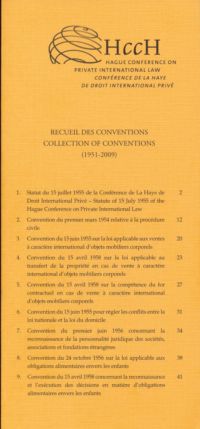Latest Issue of “Praxis des Internationalen Privat- und Verfahrensrechts” (4/2009)
Recently, the July/August issue of the German legal journal “Praxis des Internationalen Privat- und Verfahrensrechts” (IPRax) was released.
It contains the following articles/case notes (including the reviewed decisions):
- Anatol Dutta: “Das Statut der Haftung aus Vertrag mit Schutzwirkung für Dritte” – the English abstract reads as follows:
The autonomous characterisation of national legal institutions is one of the challenging tasks of European private international law. This article attempts to determine the boundaries between the Rome I and the Rome II Regulation with regard to damages of third parties not privy to the contract but closely connected to one of the parties. Notably, German and Austrian law vest contractual rights in such third parties, especially in order to close gaps in tort law. It is argued here that those third party rights, although based on contract according to national doctrine, are to be characterised as a non-contractual obligation and governed by the Rome II regime (infra III). Under Rome II, in principle, the general conflict rule for torts in Art. 4(1) applies; if the damage suffered by the third party is caused by a product, the liability towards the third party is subject to the special rule in Art. 5(1) (infra IV). Hence, the law governing the contract from which the third party rights are derived plays only a minor role (infra V): for those third party rights neither the special rule for culpa in contrahendo in Art. 12(1) – insofar as pre-contractual third party rights are concerned – nor the escape clauses in Art. 4(3) and Art. 5(2) lead to the law which governs the contract.
- Ivo Bach: “Neuere Rechtsprechung zum UN-Kaufrecht” – the English abstract reads as follows:
The number of case law on the CISG increases exponentially. Thanks to online databases such as the one of Pace University or CISG-online a majority of cases are internationally available. The rapid increase of case law, however, complicates the task of staying up to date in this regard. This contribution shall be the first of a series that summarises the recent developments in case-law and at the same time categorises the cases in regard to their topic and in regard to their importance. The series aligns with the date the respective decisions become available to the general public, i. e. the date they are published on the CISG-online database, rather than the date of the decision. This contribution covers the cases with CISG-online numbers 1600–1699.
- Alice Halsdorfer: “Sollte Deutschland dem UNIDROIT-Kulturgutübereinkommen 1995 beitreten?” – the English abstract reads as follows:
The ratification of the UNESCO Convention on the Means of Prohibiting and Preventing the Illicit Import, Export and Transfer of Ownership of Cultural Property 1970 is the perfect occasion to raise the question whether or not Germany should strive for an additional ratification of the UNIDROIT Convention on Stolen or Illegally Exported Cultural Objects 1995. While many contracting states of the UNESCO Convention 1970 did not implement comprehensive return claims for illegally exported cultural objects, the self-executing UNIDROIT Convention 1995 provides such claims and in addition further claims for stolen cultural objects. One of the major difficulties is the absence of provisions on property rights. It may be argued an initial lack or intermediate loss of ownership should not affect return claims for cultural objects with the consequence that the last possessor has to be considered the rightful claimant. Further, it may be argued that the return of cultural objects includes necessarily a transfer of possession but not a transfer of property. However, the return of cultural objects to the state from which these cultural objects have been unlawfully removed may influence the applicable law and indirectly affect property rights. Since this effect is achieved only under the condition that the lex rei sitae is replaced by the lex originis, it might be advisable to extend the scope of the ss 5 (1), 9 of the German Law on the Return of Cultural Objects in the event of a future ratification of the UNIDROIT Convention 1995.
- Martin Illmer: “Anti-suit injunctions zur Durchsetzung von Schiedsvereinbarungen in Europa – der letzte Vorhang ist gefallen” – the English abstract reads as follows:
Yet another blow for the English: the final curtain for anti-suit injunctions to enforce arbitration agreements within the European Union has fallen. As the augurs had predicted, the ECJ, following the AG’s opinion, held that anti-suit injunctions enforcing arbitration agreements are incompatible with Regulation 44/2001. Considering the previous judgments in Marc Rich, van Uden and Turner as well as the civil law approach of the Regulation, the West Tankers judgment does not come as a surprise. It accords with the system and structure of the Regulation. De lege lata the decision is correct. Moaning about the admittedly thin reasoning and an alleged lack of convincing arguments does not render the decision less correct. Instead, the focus must shift to the already initiated legislative reform of Regulation 44/2001. Meanwhile, one may look for alternatives within the existing system to hold the parties to the arbitration (or jurisdiction) agreement, foreclosing abusive tactics by parties filing actions in certain Member States notorious for protracted court proceedings.
- Matthias Kilian: “Die Rechtsstellung von Unternehmensjuristen im Europäischen Kartellverfahrensrecht”
The article reviews the judgment given by the European Court of First Instance in the joined cases T-125/03 and T-253/03 (Akzo Nobel Chemicals Ltd. and Akcras Chimcals Ltd. ./. Commission of the European Communities) which can be found here.
- Rainer Hüßtege: “Der Europäische Vollstreckungstitel in der Praxis”
The article reviews a decision by the Higher Regional Court Stuttgart (23.10.2007 – 5 W 29/07) dealing with the requirements of a European Enforcement Order Certificate in terms of Art. 9 Regulation (EC) No. 805/2004 stating that the issue of the ceritificate requires according to Art. 6 No. 1 (c) inter alia that the court proceedings in the Member State of origin met the requirements as provided for the proceeding of uncontested claims. This requirement was not met in the present case since the summons was not served in accordance with Art. 13 (2) of the Regulation.
- Christoph M. Giebel: “Die Vollstreckung von Ordnungsmittelbeschlüssen gemäß § 890 ZPO im EU-Ausland” – the English abstract reads as follows:
Under German law, the State is exclusively responsible for enforcing contempt fines issued by German courts. Thus, the State collects the contempt fine through its own public authorities ex officio. This approach is in contrast to the legal situation in several other EU Member States that allow the judgment creditors not only to decide upon the enforcement of the contempt fine but also to keep the funds obtained through the enforcement. In terms of EU cross border enforcement, it is commonly accepted that for example a French “astreinte” may be enforced in Germany by invoking Art. 49 of the Regulation (EC) No. 44/2001. However, it is still doubtful whether or not German judgment creditors could similarly enforce a German contempt fine in another EU Member State. These doubts were recently intensified by a resolution rendered by the Higher Regional Court of Munich on 3rd December 2008 – 6 W 1956/08 – (not res judicata). The Higher Regional Court of Munich has refused to confirm a contempt fine issued by the Regional Court of Landshut as a European Enforcement Order under the Regulation (EC) No. 805/2004. The Higher Regional Court of Munich basically argues that the judgment creditor has no legitimate interest to apply for such confirmation due to the German legislator having attributed the responsibility for the enforcement exclusively to the State. The arguments put forward by the Higher Regional Court of Munich would also rule out any cross border enforcement of German contempt fines according to the rules of the Regulation (EC) No. 44/2001. This would lead to a considerable disadvantage of German judgment creditors within the Common Market. In the article, the author discusses in detail the arguments put forward by the Higher Regional Court of Munich both from a German and European Community law perspective. The author comes to the conclusion that prior-ranking European Community law demands that German contempt fines may also be enforced in other EU Member States both on the basis of the Regulations (EC) No. 44/2001 and No. 805/2004. In reconciling the requirements of European Community and German law, the author proposes that the judgment creditor shall be entitled to act on the basis of a representative action for the State. The funds obtained through the enforcement in the relevant EU Member State shall therefore invariably be paid to the relevant State treasury in Germany.
- Felipe Temming: “Zur Unterbrechung eines Kündigungsschutzprozesses während des U.S.-amerikanischen Reorganisationsverfahrens nach Chapter 11 Bankruptcy Code”
The article reviews a judgment of the German Federal Labour Court (27.02.2007 – 3 AZR 618/06) dealing with the interruption of an action for protection against dismissal according to the reorganization proceedings under Chapter 11 U. S. Bankruptcy Code.
- Kurt Siehr: “Ehescheidung deutscher Juden”
The article reviews a judgment of the German Federal Court of Justice (28.05.2008 – XII ZR 61/06) concerning in particular the question whether divorce proceedings before a Rabbinical Court in Israel lead to the result that the plea of lis alibi pendens has to be upheld in German divorce proceedings. As stated by the Federal Court of Justice this could only be the case if the Jewish divorce could be recognised in Germany. This was answered in the negative by the Federal Court of Justice under the given circumstances confirming its previous case law according to which a divorce before a Rabbinical Court constitutes an extra-judicial divorce – and not a sovereign act – which can, under German law, only be recognised if the requirements of the law applicable according to German PIL (Art. 17 EGBGB) are satisfied. Due to the fact that in the present case German law was applicable with regard to the divorce according to Art. 17 EGBGB, this was not the case.
- Frank Spoorenberg/Isabelle Fellrath: “Offsetting losses and profits in case of breach of commercial sales/purchase agreements under Swiss law and the Vienna Convention on the International Sale of Goods”
This contribution analyses the computation of damages that may be awarded in order to compensate the buyer for the losses incurred on the substitution transactions as a result of the seller’s default in a commercial sales/purchase agreement. It discusses more specifically the possible compensation of substitution and additional losses with any profits incurred on a single substitution transaction, and on successive substitution transactions, focusing on the articulation of the international and Swiss law provisions governing general losses and substitutions losses. Reference is made by ways of illustration to a recent unpublished ICC arbitration award addressing the issue from a set off perspective.
- Dirk Otto: “Formalien bei der Vollstreckung ausländischer Schiedsgerichtsentscheidungen nach dem New Yorker Schiedsgerichtsabkommen” – the English abstract reads as follows:
The author criticises a decision of Austria’s Supreme Court which required a party seeking to enforce a foreign arbitration award in Austria to submit a legalised original or certified/legalised copy of the arbitration award although the defendant never disputed that a submitted simple copy was authentic. The author submits the correct approach would have been to require compliance with the formalities of Art. IV of the New York Convention only if (i) defendant disputes the authenticity of a copy or (ii) the enforcing court has to pass default judgment as only in these situations there is a genuine need to prove the conformity of documents.
- Götz Schulze: “Anerkennung von Drittlandscheidungen in Frankreich” – the English abstract reads as follows:
The author analyses two judgments of the French Court of Cassation pertaining to the incidental recognition of foreign divorce decrees under French law. In the first case, a Moroccan wife had filed for divorce in France. The conciliation hearings were opposed by the husband, who claimed that the marriage had already been dissolved by a final Moroccan divorce decree. The second case regarded a French married couple who had been resident in Texas. Upon separation, the husband returned to France, where he filed a petition for divorce. The admissibility of the latter was contested because divorce proceedings were already pending in Texas, which finally led to a final divorce decree. Since the cases did not fall within the scope of the Brussels II Regulation, French procedural law was applicable. In both cases, the question at stake was whether the courts had to take into account the foreign judgments when assessing the admissibility of the divorce petition. The Court of Cassation answered in the affirmative. It held that national courts have to determine the recognition of foreign divorce decrees in every stage of the procedure as an incidental question. It thereby overruled an earlier judgment, according to which the recognition of foreign judgments was reserved for the “juge de fond” and could not be determined in conciliation hearings or summary proceedings. It also held that recognition could not be denied for reasons beyond the three exhaustive grounds of non-recognition established under French law, which are lack of international jurisdiction, misuse of rights, and public policy. In the second case, the lower court had denied recognition because the divorce decree had not been registered with the register office. The reported judgments herald an important shift in French procedural law and were unanimously welcomed by legal writers. Not only did the Court of Cassation interpret national civil procedural law in a manner as to align it with art. 21 (4) Brussels II Regulation. It also overcame the long criticised procedural privileges for French nationals. As the court made clear, art. 14 Code of Civil Procedure, which grants to every French national an international venue within the domestic territory, cannot be read as to inversely hinder the recognition of a foreign judgment.
Futher, this issue contains the following information:
- The new German choice of law rules as amended due to the adaptation to Regulation (EC) No. 593/2008 (Rome I) which are applicable from 17 December 2009: “Das EGBGB in der ab 17.12.2009 geltenden Fassung”
- Erik Jayme/Carl Friedrich Nordmeier report on two PIL conferences held in Lausanne: “Zwanzig Jahre schweizerisches IPR-Gesetz – Globale Vergleichung im Internationalen Privatrecht”
- Ralf Michaels/Catherine H. Gibson report on the conference held at Duke Law School on 9 February 2008 titled: “The New European Choice-of-Law Revolution: Lessons for the United States?”
- Hilmar Krüger reports on the wife’s right of succession under Iranian law: “Neues zum Erbrecht der überlebenden Ehefrau nach iranischem Recht”
- Hilmar Krüger reports on the recognition of foreign decisions in the field of family law in Turkey: “Zur Anerkennung familienrechtlicher Entscheidungen in der Türkei”
 This was not an issue of first impression for the Paris Court of appeal. In a judgment of July 1, 2008, the Court had already ruled that astreinte could not be used against a foreign state (enjoying its immunity). In this case, a cleaning lady had been fired by the Embassy of Qatar in Paris. She sued before the Paris labour court. She claimed for payment of unpaid wages, but also for an injunction to produce a variety of documents related to her employment, under the penalty of an astreinte.
This was not an issue of first impression for the Paris Court of appeal. In a judgment of July 1, 2008, the Court had already ruled that astreinte could not be used against a foreign state (enjoying its immunity). In this case, a cleaning lady had been fired by the Embassy of Qatar in Paris. She sued before the Paris labour court. She claimed for payment of unpaid wages, but also for an injunction to produce a variety of documents related to her employment, under the penalty of an astreinte. The private owner sought a variety of remedies. First, she wanted Germany to be held responsible for the damage. Secondly, she claimed damages on the basis of liability for fault (article 1382 of the French Civil Code). Thirdly, she sought an injunction to repair the wall under a financial penalty of a certain sum per day of non-compliance (astreinte).
The private owner sought a variety of remedies. First, she wanted Germany to be held responsible for the damage. Secondly, she claimed damages on the basis of liability for fault (article 1382 of the French Civil Code). Thirdly, she sought an injunction to repair the wall under a financial penalty of a certain sum per day of non-compliance (astreinte).  In this case, a French couple had found a surrogate mother in Minnesota who had accepted to carry their child. After Ben was born, the parties had obtained on 4 June 2001 two judgments from a Minnesota court, the first finding that that the child had been abandonned by the American surrogate mother, the second ruling that he was adopted by the French couple. A birth certificate had then been delivered by the relevant Minnesota authorities.
In this case, a French couple had found a surrogate mother in Minnesota who had accepted to carry their child. After Ben was born, the parties had obtained on 4 June 2001 two judgments from a Minnesota court, the first finding that that the child had been abandonned by the American surrogate mother, the second ruling that he was adopted by the French couple. A birth certificate had then been delivered by the relevant Minnesota authorities. Intersentia have recently published
Intersentia have recently published